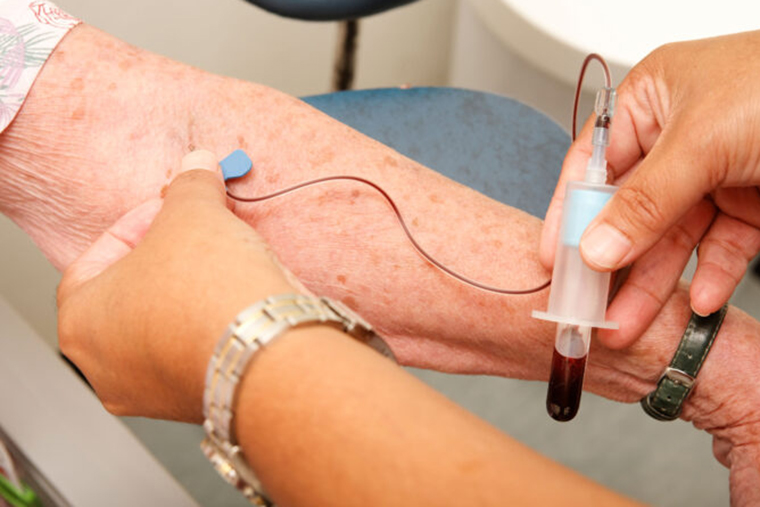2024-02-21 ワシントン大学セントルイス校

Scientists report a major step toward a simple blood test for Alzheimer’s disease. Researchers at Washington University School of Medicine in St. Louis and Lund University in Sweden showed that a blood test is as good at identifying people in early stages of the disease as cerebrospinal fluid tests approved by the Food and Drug Administration (FDA) for Alzheimer’s diagnosis. The findings indicate that a blood test soon may replace more expensive and invasive brain scans and spinal taps for detecting signs of Alzheimer’s in the brain. (Photo: Getty Images)
◆ワシントン大学医学部とスウェーデンのルンド大学の研究者による研究によれば、血液検査はアルツハイマー病の分子的兆候を脳内で検出するのに、FDAが承認した脳脊髄液検査と同等の精度を持っています。この研究成果は、血液中のアルツハイマー病関連のタンパク質レベルを測定する高感度な技術を使用しています。
◆研究では、血液検査は軽度の症状がある患者でも、脳脊髄液検査や脳スキャンと同じくらい正確にアルツハイマー病の病理を診断し、症状が現れていない段階でも脳内のアルツハイマー病の分子的兆候を検出できることが示されました。
<関連情報>
- https://source.wustl.edu/2024/02/alzheimers-blood-test-performs-as-well-as-fda-approved-spinal-fluid-tests/
- https://www.nature.com/articles/s41591-024-02869-z
アルツハイマー病に対する高精度の血液検査は、臨床的髄液検査と同等かそれ以上である Highly Accurate Blood Test for Alzheimer’s Disease Comparable or Superior to Clinical CSF Tests
Nicolas R. Barthélemy,Gemma Salvadó,Suzanne Schindler,Yingxin He,Shorena Janelidze,Lyduine E. Collij,Benjamin Saef,Rachel L. Henson,Charles D. Chen,Brian A. Gordon,Yan Li,Renaud La Joie,Tammie L. S. Benzinger,John C. Morris,Niklas Mattsson-Carlgren,Sebastian Palmqvist,Rik Ossenkoppele,Gil D. Rabinovici,Erik Stomrud,Randall J. Bateman & Oskar Hansson
Nature Medicine Published:21 February 2024
DOI:https://doi.org/10.1038/s41591-024-02869-z
Abstract
With the emergence of Alzheimer’s disease (AD) disease-modifying therapies, identifying patients who could benefit from these treatments becomes critical. We evaluated whether a precise blood test could perform as well as established cerebrospinal fluid (CSF) tests in detecting amyloid-β (Aβ) plaques and tau tangles. Plasma %p-tau217 (ratio of phosporylated-tau217 to non-phosphorylated tau) was analyzed by mass spectrometry in the Swedish BioFINDER-2 cohort (n=1,422) and the US Knight ADRC cohort (n=337). Matched CSF samples were analyzed with clinically used and FDA-approved automated immunoassays for Aβ42/40 and p-tau181/Aβ42. The primary and secondary outcomes were detection of brain Aβ or tau pathology, respectively, using PET imaging as the reference standard. Main analyses were focused on individuals with cognitive impairment (mild cognitive impairment and mild dementia), which is the target population for available disease-modifying treatments. Plasma %p-tau217 was clinically equivalent to FDA-approved CSF tests in classifying Aβ PET status, with an area-under-the-curve (AUC) for both between 0.95-0.97. Plasma %p-tau217 was generally superior to CSF tests in classification of tau-PET with AUCs of 0.95-0.98. In cognitively impaired sub-cohorts (BioFINDER-2: n=720; Knight ADRC: n=50), plasma %p-tau217 had an accuracy, positive predictive value and negative predictive value of 89-90% for Aβ PET and 87-88% for tau-PET status, which was clinically equivalent to CSF tests, further improving to 95% using a two cut-off approach. Blood plasma %p-tau217 demonstrated performance clinically equivalent or superior to clinically used FDA-approved CSF tests in the detection of AD pathology. Use of high performance blood tests in clinical practice can improve access to accurate AD diagnosis and AD-specific treatments.


